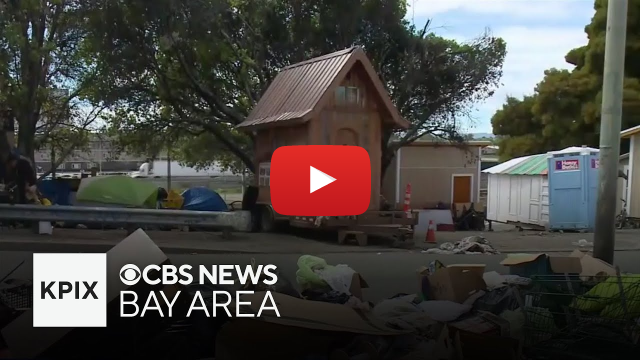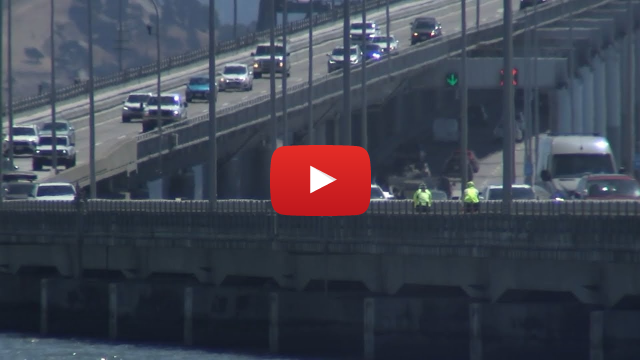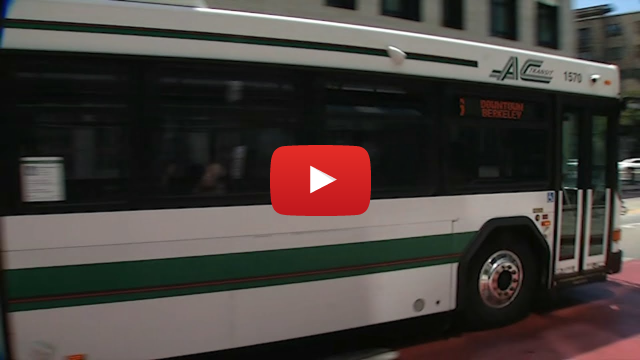|
East Bay Today • Mon, Aug 11 |
|
|
|
Hello and happy Monday! Today, the East Bay mourns longtime AC Transit At-Large Director H.E. Christian “Chris” Peeples, who passed away last week after nearly three decades of service, according to a statement from the bus agency. Aptly enough, this week’s newsletter features a heavy focus on local transportation news. Read on as we recap last week’s biggest local news stories:
|
|
|
-
Alameda County leaders approved a plan to spend most of the $1.8 billion Measure W sales tax fund on homeless services.
-
The Richmond Bridge will close to pedestrians and cyclists from Monday through Thursday mornings, for at least a three-year trial run starting in October.
-
AC Transit’s new “Realign”-ed bus service map is now in effect. Some bus lines will see reduced service, while other areas will see some improvements.
|
|
|
|
EAST BAY WEATHER |
|
The inner East Bay will be mostly chilly and breezy this week, with partly cloudy skies and highs in the low 70s in our forecast until the weekend. By contrast, Eastern Contra Costa County will be at its hottest today with a high of 90 degrees, cooling off to 85 by the weekend. Gotta love those microclimates! ☀️ |
|
|
|
|
|
1) Alameda County approves sales tax spending on homeless services, safety net |
|
The Mercury News reports that the Alameda County Board of Supervisors has approved a spending plan for $1.8 billion in Measure W sales tax revenues. The plan dedicates 80% to homeless services and housing programs, and 20% to bolster other safety-net services such as food assistance and healthcare that have recently seen massive federal budget cuts. Measure W, a county sales tax narrowly approved by voters in 2020 and upheld by the California Supreme Court earlier this year, was promoted as a homelessness reduction measure, and some public speakers at the board meeting urged the board to direct at least 90%, if not all of the money, to that purpose to maintain trust with voters. The measure’s funds will be disbursed geographically based on homeless population data, with the largest share (58%) going to the Oakland/Piedmont area, and the board will later decide whether to establish a $15 million Emergency Stabilization Fund for nonprofit housing providers.
|
|
|
 |
|
Watch recent coverage of Measure W from our local CBS affiliate. (Video: KPIX CBS News Bay Area via YouTube) |
|
2) Richmond Bridge will close bike/walking lane starting in October |
|
Richmondside reports that the Bay Conservation and Development Commission (BCDC) has approved a three-year pilot that will limit the Richmond–San Rafael Bridge bike and pedestrian path to Thursday afternoons through Sundays, closing it on weekdays so the lane can be used as a breakdown and high-occupancy vehicle shoulder (not, as some misinformation I’ve seen out there claims, an actual travel lane). Scheduled to begin in October, this change follows a 15-2 vote after more than seven hours of public testimony. A free weekday shuttle for cyclists and pedestrians will be offered, but Bike East Bay advocacy director Robert Prinz warned in an interview with ABC7 News that “people with disabilities who won’t be able to use the proposed shuttle or those who need to bike overnight when there is no shuttle or bus access” will lose access, adding that 88% of the 350 public comments favored keeping the bike-walk path open 24/7. (Full disclosure: I am a dues-paying member of Bike East Bay, so naturally I share Prinz’s view on this.) Advocates also argued that the decision was an unprecedented violation of BCDC’s mission statement – in particular, its guiding principle to provide “maximum feasible public access” to the shoreline. |
 |
|
Watch recent coverage of rhe Richmond-San Rafael Bridge from our local ABC affiliate. (Video: ABC7 News Bay Area via YouTube) |
|
|
|
3) AC Transit upgrades 104 bus routes |
|
Berkeleyside reports that AC Transit implemented its “Realign” network redesign on Sunday, with 104 updated and new routes adjusting for lower post-pandemic ridership and a $41.5 million budget deficit. The plan will reduce service in some areas, such as the Berkeley Hills, and replace the San Pablo Avenue 72R rapid line with a slower 72L (“limited service”), while boosting frequency on other routes like the 12 line, and notably, a new line 22 brings bus service to Alcatraz Avenue on its roundabout route from downtown Berkeley to West Oakland BART to Lakeshore Avenue. AC Transit representatives have described these changes as an effort to create a more balanced bus network by shifting limited resources to higher-demand corridors, though some riders have expressed concern about longer travel times and reduced service to certain neighborhoods.
As one of those riders myself, it’s a sad reality that there will always be difficult tradeoffs to make with limited resources, and while I don’t always agree with AC Transit’s decisions, many of these limitations are outside its power to change. In addition to small shares of funding from state, regional, and rider fare sources, a quarter of the agency’s operating revenue comes from property taxes, which are held far below ad valorem land prices under California’s regressive Proposition 13 regime. While cash-strapped transit agencies understandably tend to focus on routes that already have high ridership, we should also keep in mind that state environmental regulators have been warning that we need to reduce automobile trips by at least 25% by 2030 to meet our emission reduction goals. To increase public support for new funding initiatives–which the Bay Area may be voting on as soon as 2026–public transit needs to be more competitive with private cars for all trips, not just rush-hour commutes to commercial areas. But for now, the agency still lacks the resources to please everyone in the far-flung special district, which stretches from El Sobrante to Fremont.
For example, take a look at the 2,000 acre publicly-owned Tilden Regional Park up in the Berkeley Hills, which has seen repeated cuts to bus access over the years. If you don’t own a car, good luck getting there easily: since 2020, there has been zero bus service to the area on weekends. Weekday service on the Tilden-serving 67 line will go from running every 30 minutes to once an hour. So I wholly agree with North Berkeley’s city councilmember Shoshanna O’Keefe’s statement describing this as part of a “doom loop” that exacerbates transit deserts and automobile dependence. At the same time, there is also new service to Reinhardt Redwood Regional Park and the Chabot Space & Science Center in Oakland on a new line 31.
Reminder: there’s no reason to accept these tradeoffs as our new normal! Great public parks and great public transit go hand in hand – we can and should invest in both. For more background, I recommend my Berkeley neighbor Darrell Owens’ detailed analysis of AC Transit service reductions over the years.
|
 |
|
As usual, our local ABC affiliate is on the case! (Video: ABC7 News Bay Area) |
|
|
|
CLIP OF THE WEEK |
 |
|
|
|
Check out this visual tour of the Gallery of Natural Sciences at the Oakland Museum of California! (Video: Oakland Museum of California via YouTube) |
|
|
|
That wraps it up for me this week. Go out and be excellent to each other, and let’s make the East Bay’s history one can we look forward to reading.
— Diego Aguilar-Canabal
About me: I was born and raised in Silver Spring, MD, and have also lived in Mexico City. After coming to the Bay Area in 2010, I have dabbled in fields such as journalism, music technology and social services, but I most recently served as a legislative assistant with the City of Berkeley. I am currently studying accounting because I enjoy learning about how things work.
Please send any questions, comments, criticisms, tips, cool photos or curry recipes to me by responding to this newsletter. |
|
|